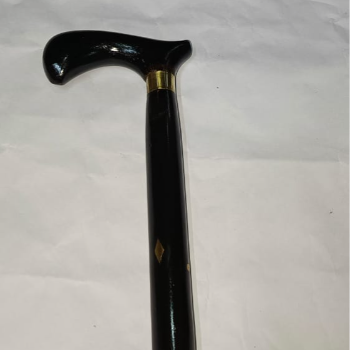In the bustling streets of Jaipur, amidst the vibrant colors and sounds, resides Meera, a spirited 68-year-old woman who has always been the heart and soul of her family. Known for her infectious laughter and zest for life, Meera's world recently took a turn when she began experiencing discomfort in her knees. It was a gradual process, but over time, she found herself hesitating to join her friends for their morning walks or visit her beloved local market.
The challenge was not just physical; it was deeply emotional. The fear of losing independence was looming large over Meera, a reality that many of her peers faced silently. For Meera, the thought of depending on others for mobility was daunting. But then, a simple yet elegant solution showed her the path to reclaim her freedom – an exquisitely crafted Indian walking stick.
For generations, walking sticks have been more than just a tool for support in India. They symbolize dignity and independence, a testament to resilience and grace. Meera's walking stick, handcrafted by skilled artisans, was not only a practical aid but also an emblem of her personality, adorned with intricate carvings that told stories of its own.
Walking sticks, like the one Meera found, address a distinct and pressing problem faced by many seniors the challenge of maintaining independence while managing mobility issues. This problem is not just a physical barrier but an emotional one, as it can erode confidence and diminish the quality of life. The walking stick became Meera's ally, offering her the stability she needed while restoring her confidence to step out into the world.
Consider the story of Ramesh, a retired school teacher from Pune, who had a similar experience. After a minor fall, Ramesh became wary of venturing out alone. The fear of falling again held him captive within the confines of his home. It was only after he began using a walking stick that he rediscovered the joy of his evening strolls, reconnecting with old friends and savoring the simple pleasures of life he had missed.
The emotional lift from such a simple tool is immense. Beyond the physical support, it brings a renewed sense of confidence and autonomy. Walking sticks like Meera's and Ramesh's are designed with ergonomics in mind, ensuring comfortable and reliable use. The height is adjustable, accommodating users of different statures, while the rubber-tipped base ensures a firm grip on any surface.
Moreover, these walking sticks are more than functional aids; they are accessories that complement one's style. The craftsmanship involved in their creation is a testament to India's rich cultural heritage, making each piece a unique work of art. For many, owning such a walking stick is a matter of pride, reflecting their individuality and personal journey.
In today's fast-paced world, the importance of mobility aids cannot be overstated, especially as they cater to both practical needs and emotional well-being. The right walking stick can be a life-changing companion, allowing individuals like Meera and Ramesh to continue leading active, fulfilling lives without the constant shadow of dependency.
As Meera strolls through the market now, her walking stick in hand, she radiates the same joy and confidence she has always been known for. It's not just a stick; it's a symbol of her independence, a testament to her resilience, and a reminder that with the right support, one can conquer any challenge.
For those facing similar struggles, consider the transformative power of a walking stick. It’s more than a tool; it’s a partner in your journey, helping you embrace life with every step. Whether it’s the streets of Jaipur or the lanes of Pune, these walking sticks are quietly empowering individuals, one step at a time. So, take that step with confidence and rediscover the world around you.
Visit Vyaparify Site:
https://id.vyaparify.com/nobel-handicraftsLocation:
CCRM+G4R Nagina, Uttar Pradesh 
